How To Choose a Welding School
Welding schools offer specialized training programs designed to equip you with the necessary knowledge and hands-on experience to excel in the industry. However, with so many options available, many ask how to choose a welding school.
In this article, we will present a complete guide to welding education, covering the four main types of institutions you can get your welding certificate or degree.

Why Is Welding Education Important?
While it is possible to learn welding through self-study and practical experience, getting formal education in welding offers numerous advantages and benefits. Formal welding education provides a structured approach, safety awareness, comprehensive knowledge, certification opportunities, practical experience, networking, and career advancement prospects.
First, welding education covers a wide range of topics, including welding techniques, metallurgy, blueprint reading, mathematics, and welding codes and standards. This comprehensive knowledge equips welders with a solid foundation, enabling them to tackle complex projects, understand industry requirements, and adapt to evolving technologies.
While it is not always required, many employers and industries require specific certifications. The most common ones are provided by the American Welding Society (AWS) or other reputable organizations. These certifications validate the welder's skills, expertise, and adherence to industry standards.
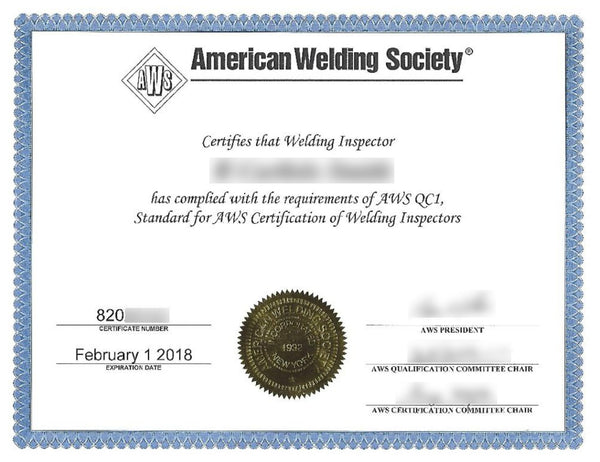
Where To Start Your Welding Education?
The great thing about a welding career is that there are so many options today. Welding programs and education overall are widely available in one of the options such as:
- Technical schools
- Community colleges
- Apprenticeship programs
- University
Graduating from any of the options above will grant you a formal welding education or at least certification. Still, all the options differ in terms of length, cost, and credentials earned. So to help you choose the best welding schools, we will have to explain how each differs.
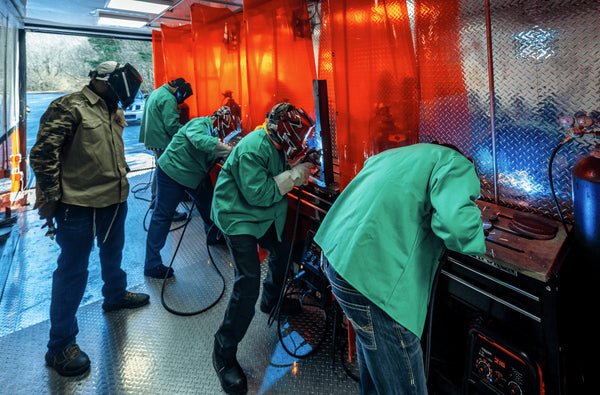
Technical Welding Schools
Technical schools, such as Lincoln welding school, provide vocational education or technical skills required to complete the tasks of a specific job. These will grant you a welding certificate and the fastest way to get you to formal welding education.
Vocational schools rose in popularity as an answer to a growing shortage of welders, as they offer shorter and cheaper programs, so you can get into the welding industry faster and start developing a career. According to AWS, welding is a high-demand job with a projected shortage of 360,000 welders by 2027. This means that approximately 90,000 welding jobs will need to be filled annually, and technical college or school is the fastest way to deal with this issue.
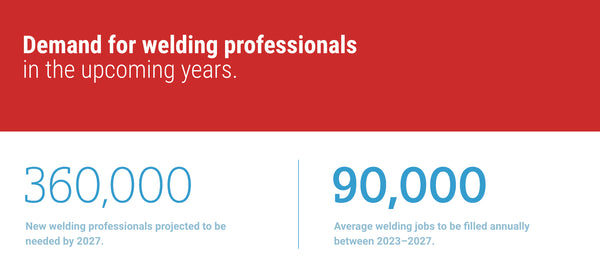
How Long Does A Technical School Last?
As noted above, technical schools are the fastest way to get your welding education. Depending on the school, it will take you an average of 6 to 18 months to finish a technical school course. Basic Welding programs are even shorter, as you can complete them in 4 months, but they offer a limited amount of knowledge. Meanwhile, Welding Technology programs typically last 16-18 months, but they provide significantly higher learning.
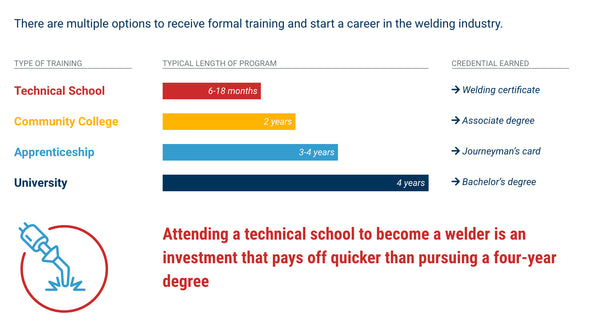 Source: https://weldingworkforcedata.com/
Source: https://weldingworkforcedata.com/
During the Welding Technology programs, welding students learn about welding processes and welding equipment required to weld using gas metal arc welding(GMAW), shielded metal arc welding (SMAW), flux-core arc welding (FCAW), and gas tungsten arc welding (TIG welding). Students also learn how to weld in flat, horizontal, vertical, and overhead welding positions often used in pipe welding. These advanced programs will also teach you about welding safety, reading blueprints, and equipment handling and maintenance.
How Much Does A Vocational School Cost?
The overall costs of technical schools will vary on the selected program, but technical schools are among the cheapest way to get certification. According to AWS Workforce Data Sheet, the average cost of completing a school is $33,000. Shorter and basic courses cost $3,000-$4,000, while advanced classes or structural welding courses go up to $20,000. With the added expenses and student debt of approximately $10,000, it rounds up to the average price of $30k.
What makes technical school a popular choice is the high return on investment. According to the AWS data sheet, certified welders earn an average of $44,000 a year, which is lower than bachelors, earning roughly $5000 more. However, lower prices and shorter duration mean significantly higher ROI after ten years compared to community college or university.
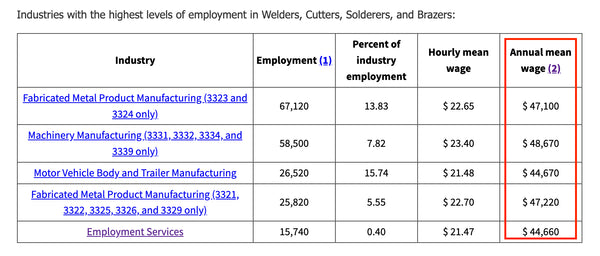
What Credentials Do You Get After Completing A Course?
After completing a course in vocational schools, you get welding certificates that prove the learned skills. When choosing a welding school, you should make sure that certification is accredited by the American Welding Society or other reputable organizations.
The welding certificate is the first step in your welding career, and it usually denotes that you are aware of basic welding processes and welding positions and understand the fundamentals of welding, equipment handling, and maintenance. As noted, potential employers might ask for certification, and it will significantly increase your chances of getting a job. Additionally, higher welding degrees might require at least a welding certificate to continue.
Community Colleges
If you want to commit more to your welding education, consider longer courses and programs usually found in community colleges. Many community colleges across the states today offer welding programs, and they can be your way to a good welding school. College courses are typically longer and more costly than vocational schools, but they offer higher degrees, potentially bringing you a higher salary.
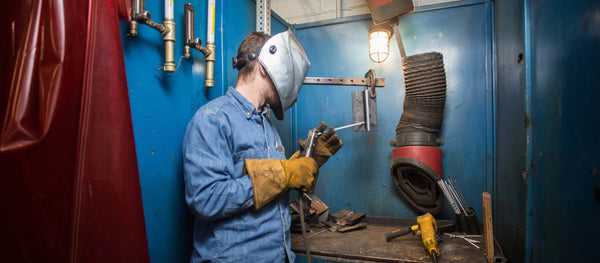
What Welding Credentials You Earn After Graduating From College?
After graduating from Community College, you can earn a welding associate degree. The welding technology associate degree program teaches the fundamentals of welding techniques, welding technology, welding tools, welding design, welding materials, various testing methods, and robotic welding.
You also take technical math, communication, and other standard education programs to help you perform better in a workshop setting. Graduates should be able to weld utilizing various procedures, check and test welding jobs, and apply welding safety requirements.
An associate degree typically brings a higher salary, and you can pursue welding careers as a welding technician, inspector, supervisor, or estimator. Additionally, an associate degree is required to pursue a career in Welding Engineering or other advanced careers. These can earn you well over the average welder's salary of $47,540 a year.
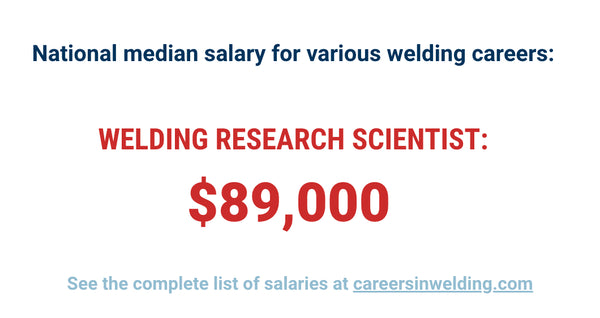
How Long Does A Community College Last?
To earn a higher level of degree, you will need more hands-on training, education, and practice. Associate degree welding technology courses usually last 2 years, but you can complete the prerequisites for a conventional six-term program in as little as 18 months.
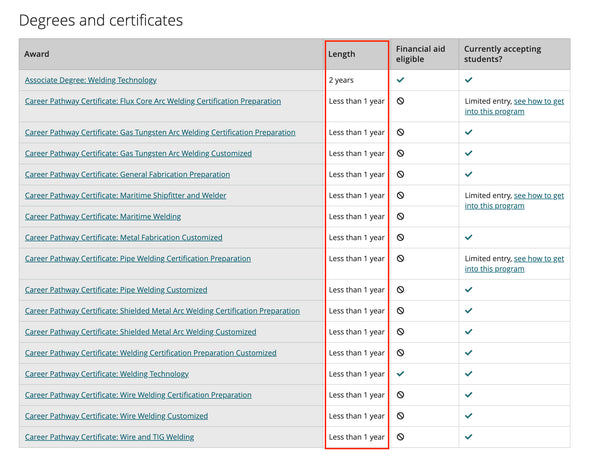
Keep in mind that some colleges offer shorter courses that are equivalent to certification, and will yield certificates, so pay attention when making your choice. If you want an associate degree, look for colleges that offer one, and make sure that AWS or other organizations accredit programs. After completing the classes, you can also earn a welding certificate that will open doors for an associate degree and further education.
How Much Does A Community College Cost?
Community colleges are usually cheaper than universities and studying for a bachelor's degree, but they are somewhat more expensive than vocational schools. Typically, an associate degree in welding technology costs $10,000-$15,000 a year. With student debts and other expenses, it can be more costly than certification, but not as expensive as a university.
The ROI of an associate degree is also favorable. Even though the expenses are higher, you can earn a higher salary, and the program only lasts for a while. For example, Welder II, with an Associate's Degree, can make a $51,091 - $54,553 annual salary, and it only takes two years to get there.
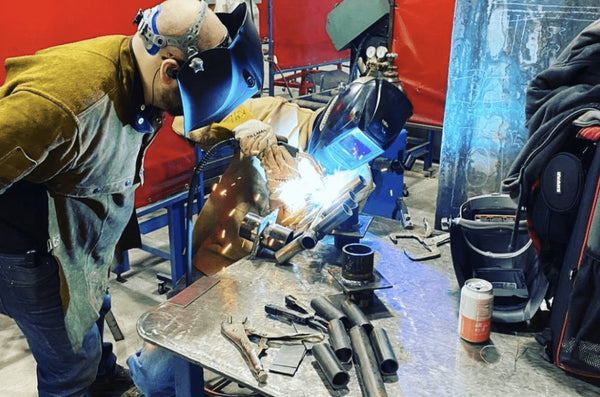
Apprenticeship Program
The rebirth of apprenticeship programs was also a great way to deal with the welder shortage that has been going on for the last couple of years. This work-based learning model allows you to have supervised on-the-job training, along with job-related education, all while earning a wage that increases during the progression of the program.
As a welding apprentice, you’ll work under the guidance of a licensed journeyman. For the first year, expect to do a lot of grunt work for the more experienced welders. However, By the end of your apprenticeship, you should be close in skill to the average journeyman, only without the title.
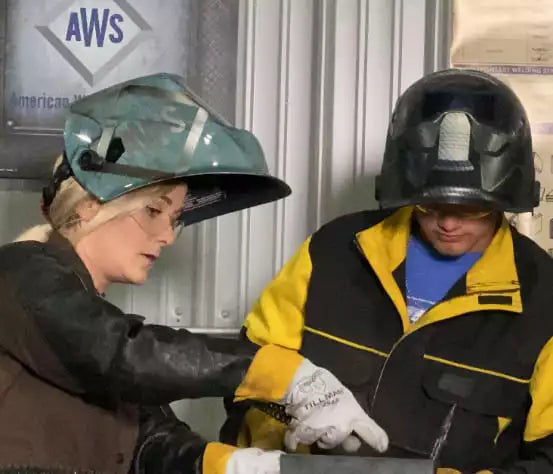
How Long Is Welding Apprenticeship?
The length of a welding apprenticeship can vary on a specific education program, but welding apprenticeships typically require at least 144 hours of classroom instruction and three to four years of on-the-job training. Therefore, this training type is more extended than technical schools or colleges. However, you don't have to pay to start a welding apprenticeship compared to the other two types.
Quite the opposite, you will get paid to learn and work. Commonly, 95% of your pay is funded by the government, and the rest is provided by your employer. But remember that your income probably won’t be too impressive in the beginning. However, as you improve, you get a higher salary.

What Credentials Do You Get After Finishing Welding Apprenticeship?
After successfully finishing the welding apprenticeship program, you are eligible for a journeyman's card. Welding journeyman's cards are issued by the United Association (UA.) The UA is a trade union covering welders, plumbers and pipe fitters, and HVAC service technicians. Earning an associate degree or vocational certificate may reduce the amount of time you need to spend in an apprenticeship, but in most cases, this is the primary route to becoming a welder journeyman.
According to Salary.com, journeyman welders can earn from $47,683 to $61,223, with an average base salary of $53,613. Therefore, a higher degree of education and more time spent learning means higher skills, therefore, a higher salary.
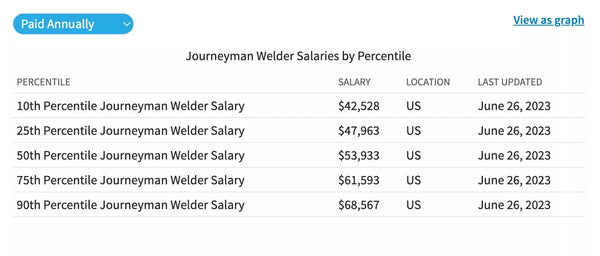
University Programs
If you are interested in mechanical design and manufacturing processes related to welding, you can study for a bachelor's degree in the field. Welding engineering majors learn the importance of product and machinery testing, maintenance, and quality control. Additionally, these undergraduates learn to communicate within a team environment and often study project management techniques.
Advanced university programs prepare students for the advanced welding world and positions as welding inspectors or instructors. A welding engineer studies the physics of welding in an effort to understand how and why the welding process works. The primary purpose of this study is to create new codes and procedures for new welding applications and to update existing codes and procedures to account for changes or adjustments to existing welding applications.
How Long Do University Programs Last?
Graduating from a university as a welding engineer takes 4 years. The prerequisites for these programs are merely having a high school diploma or GED, but some colleges may require a 2-year degree in welding technology. Others call for foundational courses in physics, chemistry, calculus, and computers, and introductory engineering class may also be required.
Besides welding foundations that are though by previous courses, the university teaches metallurgy for welding engineers, materials science Alloy fabrication, computer-aided design for engineers, welding codes, and automated machine welding.
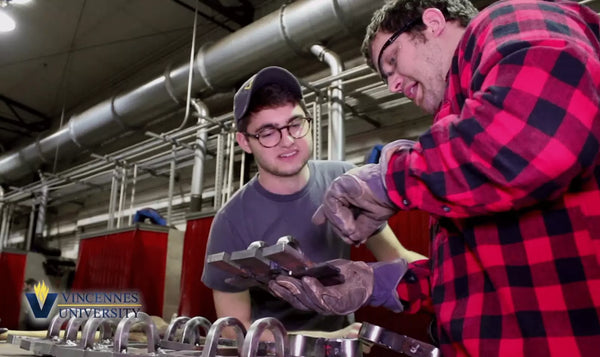
How Much Does Studying Welding At University Cost?
Attending the university is the most expensive option, but the high costs yield the highest salary. According to AWS Workforce Data Sheet, graduating from an advanced welding university costs approximately $127,000, with average student debt of $30,000. Therefore, you will have to pay quite a few bucks to graduate, but there are lots of financial aid options and grants that can help you. Nonetheless, high prices and long studying make the university a less attractive type of welding school.
The 10-year ROI of the university also could be more favorable than other types of education. Even though salary potential is exceptional, due to high costs and a longer study period, you earn half after ten years compared to technical school. Nonetheless, the high demand for a skilled workforce and high salary eventually pay off.
Welding University Degree
Graduating from the welding program at University will earn you a bachelor's degree. A degree in welding engineering opens the door to a variety of career opportunities in manufacturing (the automotive industry being a chief employer of welding engineers), research and development (R&D), and the development of welding equipment.
Welding engineer-related jobs are available in the public and private sectors. Besides working as a welding engineer, graduates of a bachelor's degree program may go on to work as:
- Professional consultants
- Welding instructors
- Welding inspectors
- Welding supervisors
Compared to traditional welding, the "white collar" nature of engineering jobs means you don’t have to get your hands dirty or put yourself at risk by engaging in the physical act of welding. Additionally, the average Welding Engineer salary in the United States, according to Salary.com, is $84,814, but the salary range typically falls between $77,866 and $93,621, which is significantly higher compared to other types of degrees.
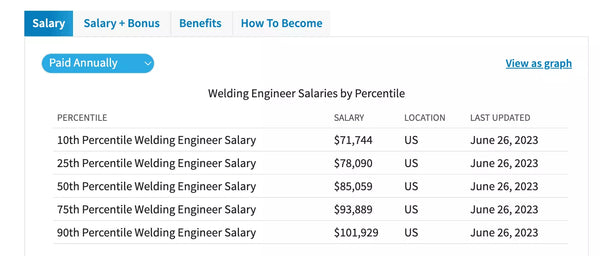
Conclusion
Due to the high demand for skilled welders, there are various options to get a welding education today. To choose the best welding school for you, you will have to set your goals straight.
If you are looking for the fastest and cheapest way to get into the welding industry, you should choose a technical school. Certification will greatly increase your chance of getting a job, you don't have to spend a lot of time in training, and the salary is decent. Community College offers an associate degree, which opens doors for higher positions and, potentially, higher education. It is more expensive and longer than ordinary schools, but it offers higher potential.
A welding apprenticeship is your go-to choice if you want to spend less money on training. Quite the opposite, you will earn money to learn and practice, but starting salary is quite low. University is the longest and most expensive way to get your education, but a bachelor's degree opens the potential for a "white collar" job and exceptional salaries.
🧐How To Choose A Welding School-FAQ
Where To Start Your Welding Education?
Welding programs and education overall are widely available in one of the options such as:
- Technical schools
- Community colleges
- Apprenticeship programs
- University
How Long Does A Community College Last?
To earn a higher level of degree, you will need more hands-on training, education, and practice. Associate degree welding technology courses usually last 2 years, but you can complete the prerequisites for a conventional six-term program in as little as 18 months.
How Long Is Welding Apprenticeship?
The length of a welding apprenticeship can vary on a specific education program, but welding apprenticeships typically require at least 144 hours of classroom instruction and three to four years of on-the-job training.








Leave a comment